 Petzlover
Petzlover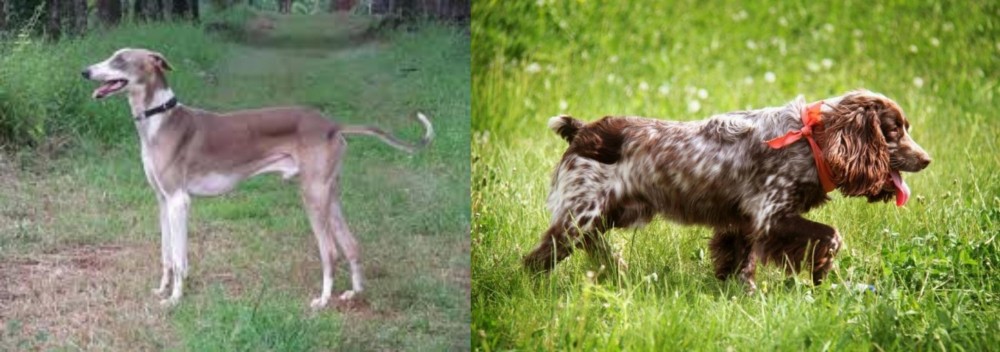 Mudhol Hound is originated from India but Russian Spaniel is originated from Russia. Mudhol Hound may grow 27 cm / 11 inches higher than Russian Spaniel. Mudhol Hound may weigh 11 kg / 25 pounds more than Russian Spaniel. Both Mudhol Hound and Russian Spaniel has same life span. Both Mudhol Hound and Russian Spaniel has almost same litter size. Both Mudhol Hound and Russian Spaniel requires Moderate Maintenance.
Mudhol Hound is originated from India but Russian Spaniel is originated from Russia. Mudhol Hound may grow 27 cm / 11 inches higher than Russian Spaniel. Mudhol Hound may weigh 11 kg / 25 pounds more than Russian Spaniel. Both Mudhol Hound and Russian Spaniel has same life span. Both Mudhol Hound and Russian Spaniel has almost same litter size. Both Mudhol Hound and Russian Spaniel requires Moderate Maintenance.
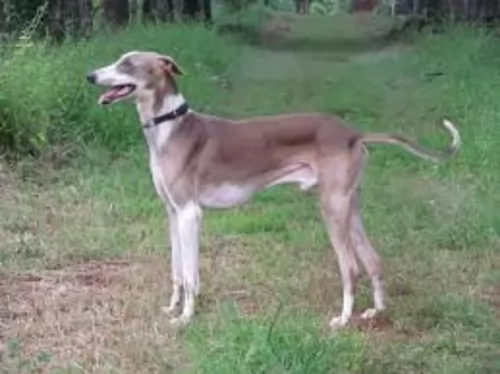 This seems to be the breed of many names. The Mudhol Hound comes from India and has been called the Caravan Hound, the Pashmi, the Karvanit, the Karwaani and the Pisuri Hound. Like so many other Indian breeds, the Mudhol Hound bears a strong look of the Greyhound. He is a sight hound and as such is lean and fast. He is ancient, healthy and loves his people.
This seems to be the breed of many names. The Mudhol Hound comes from India and has been called the Caravan Hound, the Pashmi, the Karvanit, the Karwaani and the Pisuri Hound. Like so many other Indian breeds, the Mudhol Hound bears a strong look of the Greyhound. He is a sight hound and as such is lean and fast. He is ancient, healthy and loves his people.
The ancestors of the Mudhol include the hounds bred by the tribes of Bedar near Mudhol and Halagali. In Maharashtra the Maratha warriors were also breeding hounds which are included in the Mudhol Hound lineage. It is believed that there is Tazi and Saluki heritage in the Mudhol as well.
All of these Indian hounds were good at guarding, hunting and as companions. Then the King of Mudhol began to breed them specially for hunting and succeeded in developing a sleek, slender dog. The King of England at the time, George V, was so impressed he dubbed them the Hounds of Mudhol.
The Mudhol Hound hunts rabbits and other small animals with their incredible sight. No matter if the breed was on a postage stamp in 2005 and is a great family companion, it is first and foremost a working dog. He was specifically bred for the tough working conditions in the mountains of India. They are courageous, loyal and graceful. They are committed to their people but a little standoffish with anyone else and make good guard dogs.
They were used by the Indian Army as border protection and surveillance dogs. They use them for testing of their veterinary corps. They have been deployed by the Army in Kashmir and Jammu in 2017, just as they were centuries ago. They were effective at taking down soldiers and horses alike.
They were also chosen for breeding at the Canine Research and Information Centre, part of the Karnataka Veterinary, Animal and Fisheries Sciences University in Bidar. With a very high prey drive they can get along with other dogs their size but cannot be trusted with smaller pets.
The Indian National Kennel Club lists them as the Mudhol Hound while the Kennel Club of India recognizes them as the Caravan Hound.
 The Russian Spaniel is a gun dog which has originated from the English Cocker Spaniel and the English Springer Spaniel. Today while he is a gun dog he is more of a companion dog.
The Russian Spaniel is a gun dog which has originated from the English Cocker Spaniel and the English Springer Spaniel. Today while he is a gun dog he is more of a companion dog.
The Russian Spaniel has been spoken about since 1891. Different Spaniel breeds were imported to Russia to be used for hunting but some of the smaller spaniels weren't suited to the weather conditions.
At the beginning of the 20th century, breeding programs got underway for longer legged spaniels, and by the late 1930's there were a variety of different spaniels in Moscow.
After World War II, more purposeful breeding got underway and this led to the the Russian Spaniel standard in 1951. The popularity of the dog has increased and in 2002 the Russian Spaniel Club was set up in the United States. The dog isn’t recognised by any major kennel clubs.
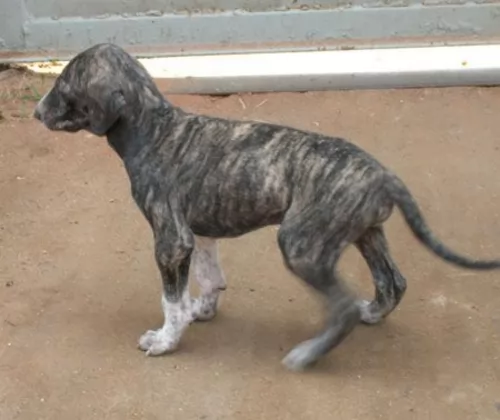 The Mudhol Hound is a good looking sight hound. Slender, sleek, muscular. They have narrow, long heads with a muzzle that tapers. They have long and powerful jaws with a large black nose. Their eyes are oval, large and brown with a look that pierces, and they have long, muscular, and clean shoulders. The legs are straight, long and strong with a broad, muscular, long back. Like most sight hounds when you seen them coming at you straight on, they have the appearance of being one dimensional.
The Mudhol Hound is a good looking sight hound. Slender, sleek, muscular. They have narrow, long heads with a muzzle that tapers. They have long and powerful jaws with a large black nose. Their eyes are oval, large and brown with a look that pierces, and they have long, muscular, and clean shoulders. The legs are straight, long and strong with a broad, muscular, long back. Like most sight hounds when you seen them coming at you straight on, they have the appearance of being one dimensional.
There are two types of coat and many acceptable colors. The coat can be silky on the tail, legs and ears or it can be completely smooth from head to toe. The coat can be grey, black, cream, red, fallow, and fawn. It can also be one of these colors and a small amount of shite blended it.
 The attractive little Russian Spaniel stands at 38 – 45cm in height ad weighs between 9 and 16kg. He is such a sturdy little dog too, looking very similar to the English Cocker Spaniel.
The attractive little Russian Spaniel stands at 38 – 45cm in height ad weighs between 9 and 16kg. He is such a sturdy little dog too, looking very similar to the English Cocker Spaniel.
The coat is short and silky with quite a bit of feathering around the legs and ears. Colors of the coat can be anything from reddish brown and white with freckles to black and white with freckles.
Aside from the Russian Spaniels' hunting abilities, they make great family pets and are playful with children.They’re devoted to their human families and become particularly attached to one person in the family.
Such devotion leads them to being a bit cool around strangers, not liking anyone unfamiliar to get too close to any of his family members.
He is intelligent and can be easily trained to obey simple commands such as sit, stay, lie down and come.
The Russian Spaniel can be happy in the suburbs, on a farm or in the city so long as he gets lots of attention and enough exercise.
 The Russian Spaniel is such an energetic, dog, full of life ad with the joys of being alive.
The Russian Spaniel is such an energetic, dog, full of life ad with the joys of being alive.
Although he was a gun dog, today he is loved for his companionship. He makes a splendid family pet and loves to be involved with the games of children.
He is easy-going and social, and just wants to spend as much time as he can with his human family. Give him all the love you have and you'll see his tail never stops wagging.
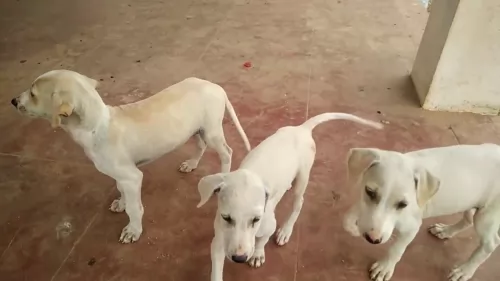 Like so many of the old breeds raised in a lot of isolation, the Mudhol is a very healthy breed. There are no genetic illnesses and they have a long line of dogs able to deal with the weather in India and avoid any sickness. However, they do have a few conditions they are prone to.
Like so many of the old breeds raised in a lot of isolation, the Mudhol is a very healthy breed. There are no genetic illnesses and they have a long line of dogs able to deal with the weather in India and avoid any sickness. However, they do have a few conditions they are prone to.
 With very few health problems, the feisty Russian Spaniel can get to 12-14 years of age. Nonetheless, there are always some of the more common health issues to look out for.
With very few health problems, the feisty Russian Spaniel can get to 12-14 years of age. Nonetheless, there are always some of the more common health issues to look out for.
Russian Spaniels are prone to developing ear infections. Ear infections can be terribly frustrating for a dog and they are quite difficult to clear up. It is advised that dog owners use ear cleaners before infection sets in. The vet can advise you on this as you have to be careful not to damage the inside of the ear.
Itchy skin can be another terrible frustration for a dog. Allergies often cause terrible itching, and your dog will go mad trying to gnaw and bite at the itch. Finding the specific cause of a skin allergy can be very challenging. Blood tests might be required. It is imperative to feed your dog some raw meat occasionally to avoid these terrible skin infections.
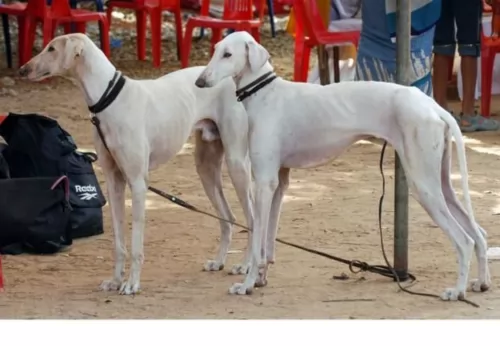 The Mudhol puppy needs a high quality dry food. They should eat three to four times a day in smaller portions. A total of 3 to 3.5 cups per day.
The Mudhol puppy needs a high quality dry food. They should eat three to four times a day in smaller portions. A total of 3 to 3.5 cups per day.
The adult Mudhol should eat about two and a half cups of high quality dry food twice a day. Do not overfeed the Mudhol and don’t let him run right after eating.
Outstanding speed and stamina
This is a high energy, active dog that needs a lot of space and exercise. She needs to be able to run freely as long as she wants at least a couple times a day. He has incredible endurance and a very high prey drive. They must be in a fenced area unless on a leash. They are great at lure coursing, fly ball and agility.
 This dog was raised to be a gun dog, and is used to having plenty of exercise. Most imperative for him will be a couple of walks each day plus lots of chase-the-ball games. These dogs just never seem to get tired as they are playful and will never let the chance of a game pass them by.
This dog was raised to be a gun dog, and is used to having plenty of exercise. Most imperative for him will be a couple of walks each day plus lots of chase-the-ball games. These dogs just never seem to get tired as they are playful and will never let the chance of a game pass them by.
Spaniel ears require quite a bit of upkeep as the hair can become extremely matted, forming balls of knotted hair. The inside of the ears must be constantly checked for infection. The spaniel’s coat will need to be brushed regularly and he can even go to the groomers and get a short Spaniel cut.
Contribute to your pet’s good health by providing him with top notch food. A good nutritious diet for the Russian Spaniel will give your dog less of a chance to get sick. Always go for the best quality commercially manufactured dog foods.
To provide your dog with just a bit of variety in his diet, some home-made food added into the dry kibble from time to time will delight your pet. No need to make preparing the food a huge issue either. Boil brown rice and chicken in a pot and add in sweet potatoes, carrots and spinach. Chop all this up, and as a treat, add smaller portions of it into the dry kibble.To avoid skin infections, try to include some raw meat into his diet occasionally.
Never leave your pet without a constant source of fresh, cool water